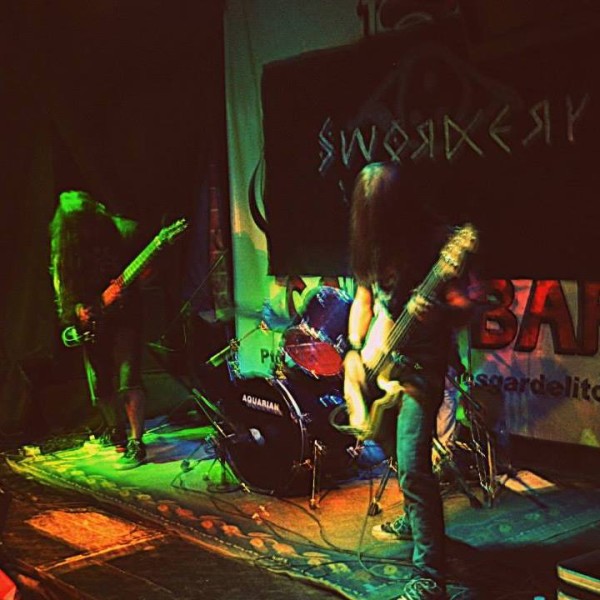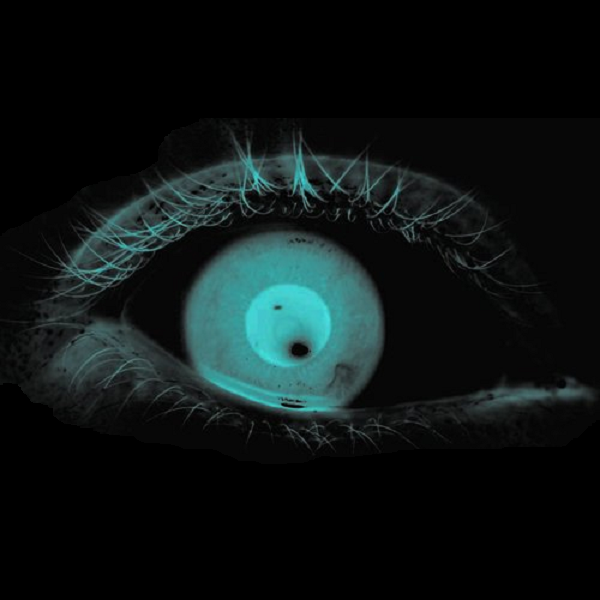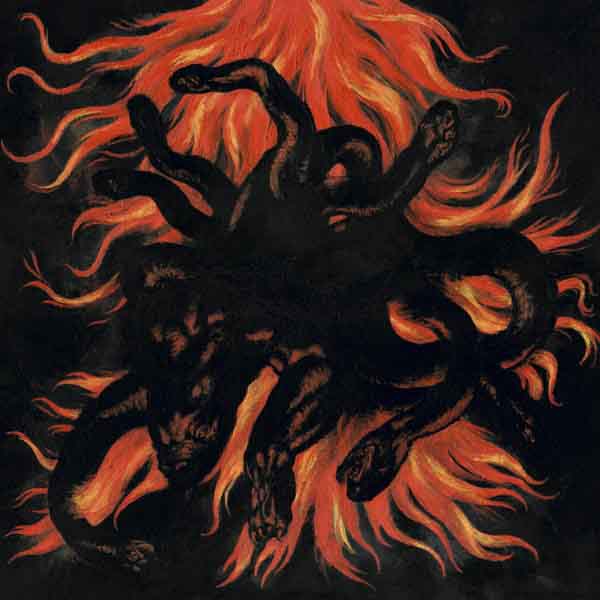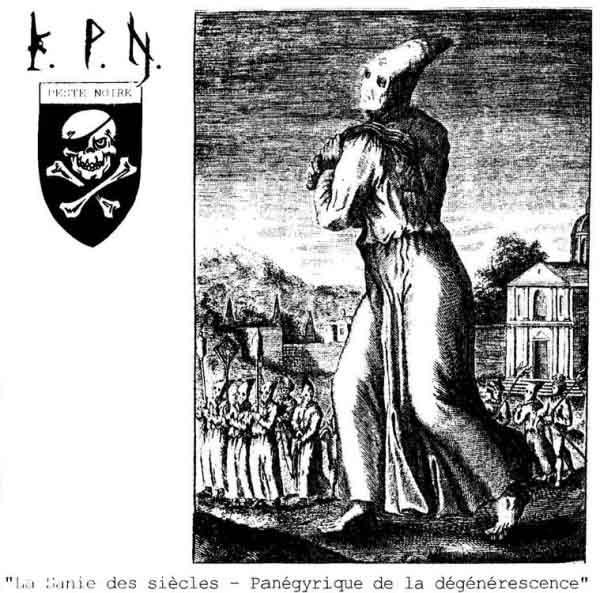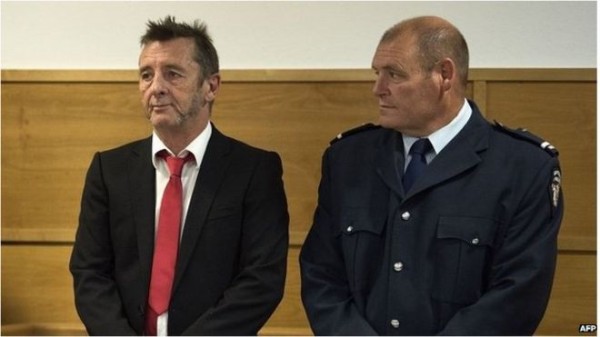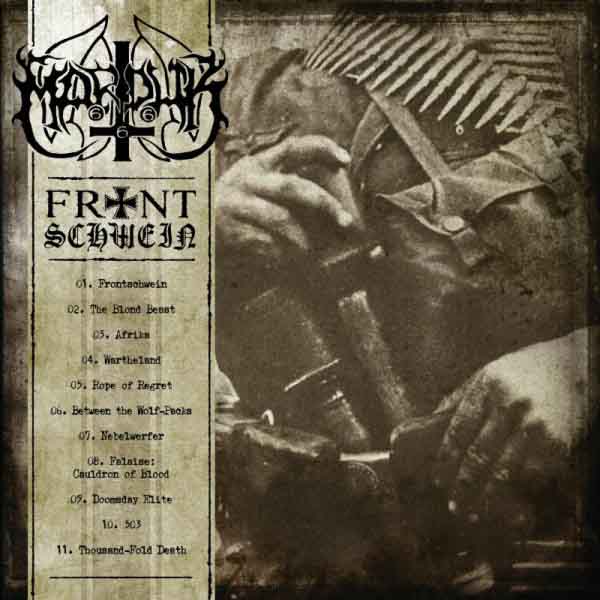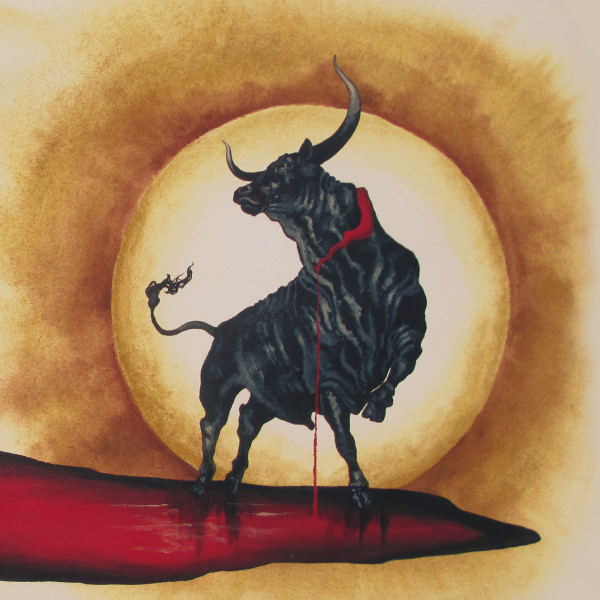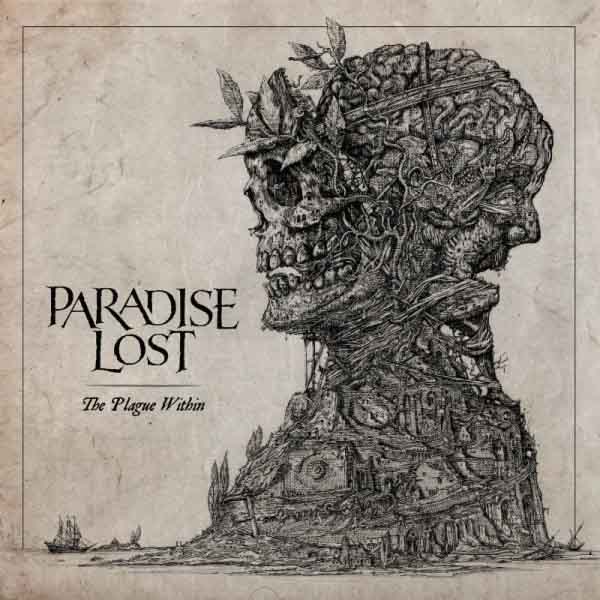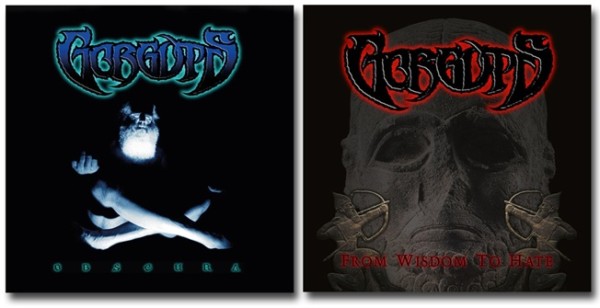After hearing their somewhat unusual fusion of NWOBHM and doom metal, I received the opportunity to have a chat with the members of Argentinian band Swordcery. They asked me to meet them off the coast and there I was, in a rowboat with a Zune to record the interview, and a submarine broke the surface of the ocean a few hundred yards away. Among the torpedos and cruise missiles, we talked about Swordcery and metal.
You are drummer in Swordcery, a heavy metal band from Argentina. Can you tell me how the band was formed, how long it has been around, and what recordings you have released?
Andrés: I was introduced to Marcos, Swordcery guitarist, by a mutual friend. He kind of auditioned for this classic rock band I was playing at the time, but while he was still learning the songs that project disbanded. A couple of days after that, we half jokingly bounced off the idea of starting up a stoner/doom metal band, as I had recently got him into The Sword and Elder, and we both enjoyed Sabbath and Black Label Society.
Andrés: Fast forward a week later, he came up with a riff (which would eventually be the beginning Ruined Realm) and we got together and just kinda worked on it, just the two of us. It took us some time to find out exactly how to play what we wanted because neither of us had any experience at creating that particular sort of metal, we just knew that we liked it a fucking lot and that we wanted in. At some point it just clicked and we decided it was time to look for a bassist. An acquaintance suggested Isaias, and we’ve been at it together ever since. This all happened almost exactly three years ago now.
Were there any particular challenges in becoming a heavy metal fan, and then a heavy metal band, in Argentina? What about in your local area?
Andrés: I think heavy metal enthusiasts in Argentina face the same challenges that people all over the world do: being relegated to obscurity, portrayed in negative stereotypes in mainstream media, etc. Same goes for those that want to carve an artistic career with metal. However, a particular trait of argentinean culture that I think plays a role in all things metal here is the fact that due to our recent historical background (mainly the military juntas and their “cultural protectionist” and nationalist policies), heavy metal and hard rock are still perceived, almost subconsciously in most people, as something foreign, a cultural artefact that does not belong in this country. I think that pushes newcomers away from metal and into more mainstream and “acceptable” interests.
Andrés: That said, there has been a somewhat vibrant but uninspired and homogeneous metal scene in our country for three decades now, and in my opinion it’s no coincidence that for the most part it has always overplayed and explored the same themes again and again: national pride, identity and social issues. Almost like it’s been trying to fit in in the cultural argentinean ethos. I’ve digressed a little bit, but this plays a role when you try to make your way, musically speaking, into the metal scene here: it gets really, really difficult to find a crowd that buys into your music if you don’t pray at that particular altar. This all applies to the local level as well, with the added bonus of living in a somewhat uninhabited area like Patagonia that makes gathering a following all the more difficult.
What type of band do you hope to be? Is this a weekend project for you, or do you want to play Eurovision?
Isaias: My greatest ambition is that our music gets recognition at least in our continent, and that it finds its way into Europe and the USA eventually, and for us to make a living of our art, travel and play around the world.
Andrés: Like Isaias said, definitely not a weekend project. Making a living out of our music would be more than enough, but I think we allow ourselves to dream as big as possible. Who doesn’t daydream of being the next Black Sabbath and playing huge arenas and all that, right?
4. What are your influences? Your music could be described as (approximately) a fusion between old Witchfinder General and modern groove-based heavy metal. What helped you along the road to this style?
Isaias: As a band, our influences lie mostly in bands that share the same genre: Black Sabbath, The Sword, Elder, Red Fang, and the like. I like to highlight the fact that we don’t only consume heavy metal. I think that’s part of what makes Swordcery different. Individually our influences are totally different and diverse.
Andrés: To elaborate on that, Marcos comes from a thrash and grunge background, infused with more extreme and technical bands like Amon Amarth and Meshuggah, for example. On the other hand, I’ve always been a fan of hard rock and classic metal, from old Judas and Rainbow to Manowar, and a big glam fan too, like early Motlëy or its more modern iterations like Crashdiet or Hardcore Superstar (Poison is shit though). We try to keep focused when we are playing as a band but I think all the wildly different influences subtly permeate the final product.
Andrés: I’d say we’ve always aimed, since day one, to create a big, fat, epic sound, like a moving wall of living thunder. Along the way we somehow developed a penchant for structurally complex songs. We are always trying to find new ways of making our brand of doom/stoner metal though, and we hope to reflect that in our upcoming releases.
What are the most important bands in the history of heavy metal to you?
Andrés: I know I might get shit on for this but my opinion is that the perfect trifecta of both hard rock and heavy metal was, is and will ever be Led Zeppelin, Deep Purple, and Black Sabbath. I’m aware that there were a good deal of bands before them that paved the way to their final sound, and bands after them that refined it, but in my opinion they were the ones who set the foundations that we still follow to this day.
Most of your music is quasi-instrumental, with few vocals. Is there a lot of interest in instrumental metal? Why did you choose to make your music this way?
Isaias: It is true that our songs are mostly instrumental, with only maybe one third of vocals, but I don’t think we wrote them like that on purpose, they just kind of came out that way, maybe due to the nature of the genre.
Marcos: I guess we made our songs that way because it simply felt right at that time. Personally, as I’m a guitarist first and a singer second, I always enjoyed the instrumental side of our songs the most, probably due to the fact that I’ve drawn lots of inspiration from bands that are highly instrumental, like Elder and Colour Haze. For better or for worse, I think this has pushed us away from the more mainstream vein of metal.
Isaias: I’d like to note that we are currently trying to shift our focus a little bit to work more on the vocal aspect of our songs, trying to come up with more interesting melodies and playing around with vocal harmonies. This doesn’t mean we are going to make another instrumental song in the future though.
Andrés: As far as interest in instrumental music goes, at least in the local level, and mostly from people that are more used to more traditional or vocal focused metal, we’ve gotten mixed criticism.
Who is in the band, who composes the music, and how do you put together songs?
Isaías: We are a three piece. Marcos sings and plays guitar, Andrés provides ambience with his drumming and writes the lyrics, and I try to fatten our tunes with my four strings. As for our composition, we never start the same way; sometimes ideas spring up while we are jamming, or we come up with a specific riff or idea in mind and then work on it, and sometimes Andrés brings a lyric and we take it from there. After that we simply work on it, the three of us.
Marcos: Instrumentally speaking, me and Isaías come up with most it, though Andrés has an active participation when coming up and picking which riffs work and which don’t. We usually try to find a way to end up with a song that the three of us feel it’s ours, which even though it might sound like its not, it’s actually very difficult.
Andrés: In the end it totally pays off because the final product is truly the brainchild of our collective ideas, which makes Swordcery almost an independent creature, a thoughtform, if you will, unlike most other bands where everything is in charge of only one or two members and one as a listener can kinda get used to a sound and see the patterns, and finally get bored with them. Sure, as Marcos says, this means it usually takes a lot of time for us to come up and finish a new song, there’s a lot of debate and brainstorming going on constantly, and sometimes there’s friction but that’s only natural, and it goes to show how much each of us care about the end product. But this synergy that we have going on, how we actively feed on each other ideas, whether they work or not, that’s what sets us apart from most bands and for me that’s what makes me feel proud of Swordcery.
Speaking on metalgate topics: have you had any clashes with censorship? What about people objecting to your lyrical content? How do you feel about the idea that there should be rules about what metal bands can sing about, or that metal bands should worry about complaints about their content or image?
Marcos: So far we’ve only been criticized for writing our lyrics in English.
Andrés: And I think that ties in with what I answered before about heavy metal still being a foreign artefact to most of the local populace and the overly pseudo-nationalist lyrical content of most local bands. People here will gladly sing along to an Iron Maiden song but if an argie band writes and sings in english it gets frowned upon. At the same time that might have kept us away from criticism because most of our audience here doesn’t have a more than a superficial knowledge of the english language.
Andrés: I personally think (and to some extent I’d say my bandmates share the sentiment) that freedom of speech is sacred, for everyone, and more so for artists because artists, and that includes comedians and the like, are the ones that usually push the envelope regarding what is socially accepted and what is not, acting as the spearhead of new ideas and lines of thinking. If you restrain that, in the name of some perceived decency, political correctness, or whatever, you’re chocking the life out of one of society’s pillars which is intellectual discourse. And anyway, as it’s been proven again and again, ideas simply can’t be restrained, no matter how much Orwellian pro-censorship idiots try to. They always find a way to seep past any barrier, and do so with twice the strength.
Andrés: That also applies to what some call self-censorship, trying to make it look like when you self-censor yourself its not really censorship. Well, I’m of the mind that self-censorship disguised as decency or whatever, although pre-emptive in nature, is still censorship, and its even worse because it means that you internalized the idea that you can’t speak your mind so much that you thought-police yourself.
Do you have fascist or neo-Nazi bands down in Argentina? Do you feel they should be censored?
Marcos: There are some, but you gotta let them do their thing. In the end if you tried to silence them you’d only be giving them publicity.
Andrés: “I disapprove of what you say, but I will defend to the death your right to say it.”
According to the band bio, you write “Lyrics focus on sword & sorcery, fantastic, and science fiction themes and literature.” What literature and stories inspire you? Do you think there’s something in common between metal, science fiction and fantasy or romantic literature?
Andrés: Most of my inspiration comes from old pulp stories of the sword & sorcery genre, like Howard’s Conan and Fritz Leiber’s swordsmen stories, Bourroughs Mars and Pellucidar series; we’ve got a song based on Tolkien’s Silmarillion too, and there’s some Lovecraft thrown in for good measure. I’ve also been an avid old school Dungeons & Dragons DM for a bunch of years now and that’s always in the back of my mind when writing lyrics (Ruined Realm originally had a lyric in spanish that detailed the adventures of a typical D&D party on an ancient fallen kingdom, for example). Video games with rich lore have always been a great source of ideas as well, like the Thief series (City of Thieves is mostly about that game’s eponymous City) and The Elder Scrolls legendarium. Lately I’ve been devouring Warhammer 40.000 lore like a madman, and as a result one of our latest songs had a grimdark sci-fi theme. Finally, there are a couple of narratives of my own devising, they too hover around the speculative fiction genre with a weird, gritty bent. I guess it’s pretty clear that as a lyric writer I’m an unapologetic escapist myself. For me, lyrics about social issues or that simply describe everyday situations and feelings without a narrative backdrop, a plot of some sort, are simply boring, both when I’m writing and when I’m reading someone else’s content.
Andrés: I’m no literature major but I think there’s definitely something in common between speculative fiction and metal. What initially drew me into metal was how easily I could be taken away with it, like a switch inside that simply goes on whenever there’s some metal playing around, almost like magic. The only thing that does the same for me is fantastic literature. There’s also the fact that metal is excessive, larger than life, over the top, some might even say, and I feel that that makes an excellent background to deal with larger than life narratives and themes which other genres might not be able to convey appropriately.
You’re going to get this question anyway, but: “Swordcery” is an awkward name. Why did you choose this? Has it caused problems? How does it reflect your music?
Andrés: It simply occurred to me one day while we were driving to practice and Marcos thought it was awesome because it was new, there’s no other band named anything remotely similar. The name’s always been an issue, especially if you keep in mind that most people here are not very proficient in anything besides spanish, but we like it enough to deal with it.
Andrés: It’s a made up word that combines sword & sorcery, which as I said before is the label applied to the literary work of Robert E. Howard and others like him. If you take our lyrics into account it works. Besides, the mental image of a barbarian wielding a sword against a chaos tainted sorcerer is metal as fuck.
If people are interested in hearing more from Swordcery and keeping up with news from the band, what should they do?
You can look us up on Facebook by our name. We are also in bandcamp as “Swordcery” too. Failing that, tell your local scrying expert too look into the empyrean realm and summon us by calling our true daemonic names.
Lineup
Guitarrista y Vocalista: Marcos Corbalan
Baterista: Andres Cabrera
Bajista: Isaías Arza
Tags: Heavy Metal, swordcery
